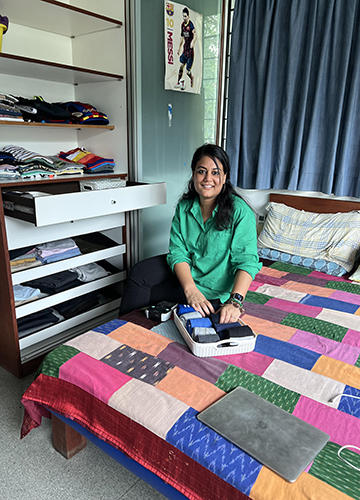Of all the desperations that propel human behaviour, few are as addictive as the constant need to surround ourselves with things―to possess and to own. Look around yourself―books you have not opened in years; entangled power cords/chargers you do not know the use for; cassettes and discs you don’t play any longer; the multiple condiments for recipes you have forgotten; mementos that bring back no memories; closets stuffed with clothes, but the common lament that you have nothing to wear; containers with no lids; gadgets you do not know how to use; clothes that no longer fit; footwear you intend to use when you start power walking... the list is endless. And yet, almost every single day you aspire some more, you acquire some more. Mysteriously, the end goal―the happiness and the contentment you seek from stuff―shifts just a bit more.

This turnstile without an exit was listed as a ‘hoarding disorder’ (HD) by the World Health Organization in 2019. It had, of course, existed much before, but was clubbed under obsessive compulsive disorders. An obsessive disorder is one where an individual is caught in the loop of an unwanted thought. It becomes compulsive when you act on that thought. Common examples are the repeated washing of hands to get rid of unwanted germs and the multiple checking of whether a key was turned properly to secure a lock.
The WHO defines hoarding as ‘a mental health condition that is characterised by the accumulation of possessions, which can significantly impair a person’s life’. Technically, it is placed in the International Classification of Diseases-11. It is a category that also includes malingering―the pretence of being sick to avoid work. But that is a story for another day.
Hoarding disorder, elaborates the WHO, is characterised by accumulation of possessions that results in living spaces becoming cluttered to the point that their use or safety is compromised. Accumulation occurs due to both repetitive urges or behaviours related to amassing items and difficulty discarding possessions due to a perceived need to save items and distress associated with discarding them. If living areas are uncluttered, this is only due to the intervention of third parties (family members and cleaners, for instance). Amassment may be passive (accumulation of incoming flyers or mail) or active (excessive acquisition of free, purchased or stolen items). The symptoms result in significant distress or significant impairment in personal, family, social, educational, occupational or other important areas of functioning.
Dr Krishna Dutt, former head, department of clinical psychology, King George’s Medical University (KGMU), Lucknow, said that our need for more was guided by the rise of three I’s. “The first is impatience―we want now. The second is individuality, where we place ourselves first. The third is intellectuality, wherein we use our intellect to justify what we say and do,” he said.
Dutt is dismayed at the constant stream of parcels, ordered by younger members of the family from e-commerce platforms, that show up at his doorstep, but is helpless. “Our perception of needs has changed. We have created a doomed fallacy, like pouring oil into a fire, imagining that the liquid would snuff out the flames,” he said.
Hoarding is not a modern malaise. Social anthropologist Aishwarya Awasthi, who specialises in public health, said, “Our close primate relatives such as orangutans hoard food. In the human evolutionary scale, Australopithecus guarded the stones they used as weapons. Homo erectus asserted ownership over tools made of wood and bones. Neanderthals made cave art to mark their territory.”
In his 2019 book Possessed: Why We Want More Than We Need, Bruce Hood, professor of developmental psychology in society at the University of Bristol, wrote, “We are so lucky to exist... and yet many of us... pursue lifestyles that have the goal of accumulating as much stuff as possible, in the belief that this is our purpose in life.... acquiring more stuff is rarely fulfilling; yet there is an insatiable desire to own more.... We believe the more we possess, the better we will be.”

Daniel Gilbert and Timothy D. Wilson, both American social psychologists and writers, put forth the word ‘unwanting’. “We tend to think of unhappiness as something that happens to us when we do not get what we want; much unhappiness…has less to do with not getting what we want, and more to do with not wanting what we like,” they wrote. “When wanting and liking are uncoordinated in this way, we may say that a person has miswanted.”
It might seem an odd kind of a word. But imagine the many number of times when what you have wanted has not given you the happiness you imagined it would. And thus, you move on to want something different. It stems from the human tendency to overestimate the duration of a thing’s influence on our happiness.
Gilbert and Wilson go on to conclude, “We want, we try, we get, we like. And then with the help of television commercials, we want some more. Wants are underwritten by our beliefs about the relation between getting and liking, and in this sense they are prescriptions for action. They tell us what to do with our time by telling us what to aim for and what to avoid.”
Of course, our desire to own things is not wholly negative behaviour. “Ownership can promote healthy behaviour such as taking pride in one’s acquisitions,” Hood told THE WEEK in an email interview. “For example, homeowners will take pride in their house and treat it much more respectfully than if it is rented accommodation. Pursuing success can be a motivating factor, but it has to be the right work/life balance.”
But it doesn’t take much for ownership to become unhealthy. Say, when it leads to behaviours that are counterproductive, explained Hood. “For example, if you pursue success and wealth at the cost of personal wellbeing (physical and mental) or stable relationships, then you might enjoy the success when it is achieved. But having worked so hard and not fostering good relationships means that you are not necessarily better off,” said Hood.
Indian medical literature on HD is limited. The first (and perhaps only) study was carried out in 2021 under the aegis of the National Health Mission in Kerala. Among the 7,000 plus respondents, the prevalence of hoarding was calculated in at just one per cent. However, as the study’s lead Dr T.S. Jaisoorya, associate professor of psychiatry at the National Institute of Mental Health and Neuro Sciences (NIMHANS), Bengaluru, said this is because hoarding is difficult to diagnose in a clinical setting.
The study noted, “Those with HD were more likely to be older and live alone.... Subjects with HD had higher odds of reporting chronic illness, depression, anxiety disorder, alcohol abuse and tobacco dependence.”
The one per cent occurrence is explained by the study thus: “Although HD is not uncommon in India, this disorder is rarely reported in speciality settings in India, which suggests that awareness and detection should be improved, considering the co-occurring negative correlates and disability among affected individuals.”
In some measure, we are all hoarders. We have more than we need, more than what we remember we have and yet find it difficult to discard. We all struggle with our mounds of possessions and struggle most significantly during festivals to bring some order to it (think the annual Diwali cleaning ritual). But it is only when things begin to impair the quality of our everyday lives might we notice that something is wrong. Also, one person’s hoard might be another’s collectible.
Reena and Diya Mishra, two Lucknow-based sisters, have been struggling to sell their ancestral home for the last five years. But every time they enter the now vacant three-storey building, they end up arguing about what they should retain, what they should give away. The sisters’relationship has grown strained. The house is caving in to neglect. It has been broken into and ransacked. But the sisters struggle with the prospect of giving up what they perceive are the last physical links to their parents.
Attaching memory to possessions is just one reason to hoard. Neha Anand, a Lucknow-based psychotherapist whose clients include the Sports Authority of India and the Uttar Pradesh police, said that hoarding could also be a defence mechanism in which things replace some other deprivation. “We tell ourselves that what seems insignificant today may become very significant tomorrow,” she said. “During the Covid-19 pandemic, for instance, people stored perishable rations that would last them a year, despite knowing that they would be useless in no time. Hoarding could also be the result of our prefrontal cortex (the part of the brain responsible for decision making) not working properly.”

The relationship between hoarding and other mental health challenges is complicated. Shrikant Srivastava, professor of geriatric psychiatry at KGMU, recalls the example of a man who hoarded garbage because he was paranoid that others would rummage through his bins. “Hoarding can be a standalone challenge, which then gives rise to other problems, or hoarding can be a symptom of other problems,” he said.
That list of other problems―resultant or causative―could range from eating disorders to dementia to Prader-Willi syndrome (a genetic disorder that affects multiple systems in the body, including the endocrine, metabolic and neurologic systems).
Archana Shukla, head, department of psychology, University of Lucknow, said that hoarding is also the result of socialisation―the lessons we glean from our immediate social environment. “Almost 90 per cent of our behaviour is modelled on what our parents do. So if they have told us it is bad to throw away things which have been paid for, that is exactly what we will do as grown-ups. Then comes re-enforcement. Suppose, we need something and we do find it in our accumulated possessions, it confirms the learning that holding on to things is good,” she said.
But when does the clutter around us become too much and when should alarm bells ring?
In the second week of September, a teacher at a management institute in Lucknow died by suicide. The note she left behind read, “I became lonely, I stopped cleaning up....”
Gayatri Gandhi, India's first KonMari certified consultant, is the founder of Joy Factory, a first-of-its-kind clutter management company in India. She said that the Covid-19 pandemic had made people realise the link between clutter and mental health as they were locked in with their clutter and had to confront it on a daily basis. “Clients reach out at different stages, each with unique challenges,” she said. “Some come to us feeling completely overwhelmed by the sheer volume of their belongings and are unsure of how and where to begin, while others seek help during major life transitions such as moving, downsizing or welcoming a new family member.” She cites the example of a client who struggled with OCD and “found it difficult to trust herself or let her family handle her things and this is when she reached out to me”.
Traditional economic logic deems that our needs―water, food, clothing, shelter―are limited. It is the wants that are unending. It is they which yield to the Keeping up with the Joneses malaise. And it is in keeping up with the Joneses that we drown ourself in things.
It seems to be a difficult road ahead. But ultimately, whether stuff will own us or we will own stuff is a decision we still can make for ourselves, for our wellbeing.




